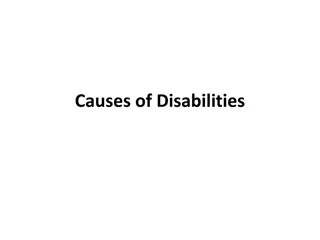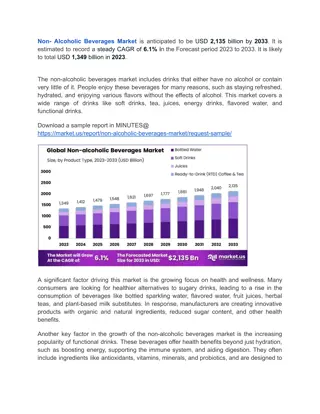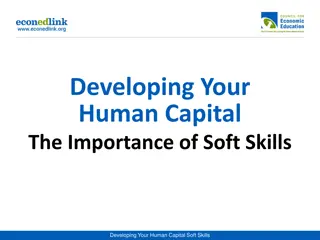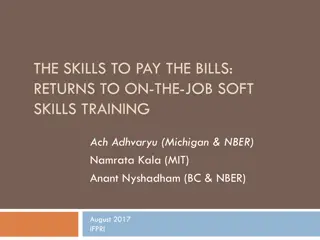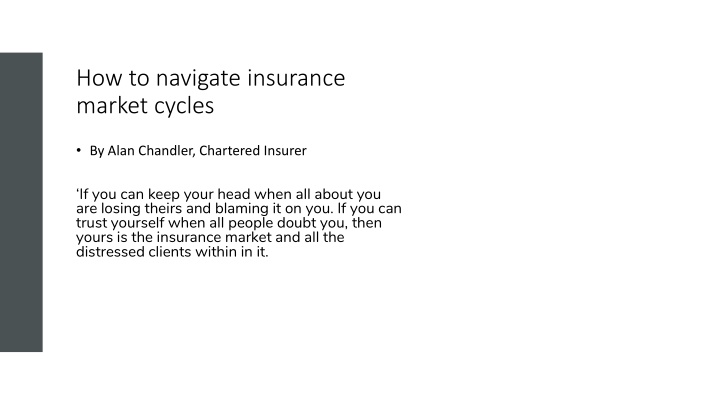
Insurance Market Cycles and Managing Changes
Learn from insurance expert Alan Chandler about navigating insurance market cycles, managing market changes, and the impact on brokers and underwriters. Explore the consequences of hard and soft markets, reasons behind recent hard market conditions, and essential insights for industry professionals.
Download Presentation

Please find below an Image/Link to download the presentation.
The content on the website is provided AS IS for your information and personal use only. It may not be sold, licensed, or shared on other websites without obtaining consent from the author. If you encounter any issues during the download, it is possible that the publisher has removed the file from their server.
You are allowed to download the files provided on this website for personal or commercial use, subject to the condition that they are used lawfully. All files are the property of their respective owners.
The content on the website is provided AS IS for your information and personal use only. It may not be sold, licensed, or shared on other websites without obtaining consent from the author.
E N D
Presentation Transcript
How to navigate insurance market cycles By Alan Chandler, Chartered Insurer If you can keep your head when all about you are losing theirs and blaming it on you. If you can trust yourself when all people doubt you, then yours is the insurance market and all the distressed clients within in it.
Alan Chandler, Chartered Insurer Alan Chandler, Chartered Insurer I have trained more than 2,000 individuals to become ACII qualified I have trained over 50% of the individuals in the last 8 years that have gone onto achieve the highest ACII pass in the whole of the UK. I train to a pass rate of more than 96% in all CII qualification levels. Certificate , Diploma and Advanced Diploma. I deliver the Allianz scholarship and academy programmes in both the UK and Ireland; provide the Zurich Ask Alan facility and I have been a Cii examiner. I have trained students who have won national prizes in almost all ACII subjects including Insurance Law (MO5), Liability (M96), Commercial Property and BI (M93), Personal Lines Insurance (P86), Business and Finance (M92), Underwriting Practice (M80), Advanced Underwriting (960), Claims Practice (M85), Advanced Claims (820), Marketing (945), Advanced Broking (930) and Advanced Risk Management (992).
LEARNING OBJECTIVES Delegates will be able to understand: What is an insurance market cycle. What causes a market cycle change. Where the market is heading in 2024. How brokers and underwriters can best manage the changing market cycle. The brokers fiduciary duty in a softening market and why insurers cannot not expect blind loyalty from brokers.
Consequences of a hard market 1. Premium increases. 2. Coverage reductions. 3. Harsher interpretation of claims - including TIA. 4. Fewer options for brokers to be able to get quotes, as insurers reduce their appetite, particularly for non-core risks. 5. In some cases there may be no cover available at all for certain clients.
1. Premium decreases. Consequences of a soft market 2. Coverage increases. 3. A slightly better interpretation of claims - including TIA. 4. More options for brokers to be able to get quotes, as insurers widen their appetite to retain GWP. 5. Less clients left without cover, as Insurers widen their appetite to seek more GWP.
Seven reasons which caused the recent hard market 1. Solvency II. 2. Ogden rate remaining in negative territory. 3. The property insurance market was running at dreadful loss-making rates. 4. Storms Dennis and Ciara cost the industry more than 500M. 5. Covid -19 caused extensive losses to insurers. 6. Reinsurance rates rose considerably. 7. Interest rates were at an all-time low meaning investment income could be relied upon by Insurers.
1. Solvency II Insurers have now capitalised; it will remain a challenge, but the industry has got used to the new world. Ogden rate remaining in negative territory unlikely to worsen and probably go higher. The property insurance market was running at dreadful loss-making rates rates have risen considerably. Storms Dennis and Ciara cost the industry more than 500M rate strength has given insurers an ability to absorb more loses. Covid -19 caused extensive losses to insurers now excluded! Reinsurance rates rose considerably rate strength has slowed. Interest rates were at an all-time low meaning investment income could be relied upon by Insurers interest rates now well above 4%, plenty of investment income to be had. 2. 3. Do these seven reasons still exist? 4. 5. 6. 7.
What next? The market will gradually start to soften, it will happen at different speeds in different markets. We have gone past 12 o clock in the cycle.
Why will the market soften? The recent hard market started in 2020 historically, hard markets do not last longer than three years. Investment income is now very tempting indeed. Holding large chunks of capital to meet solvency two can seem much less of a burden when the bond market is paying over 4%. 100% COR s mean decent profit now. Rates have gone back to a sensible level in most classes of business, which means it is easier to absorb losses. New entrants will now be tempted in, and existing entrants will expand capacity to get more of the investment income and profit available. It s the law of supply and demand.
Insurers, and to a large degree brokers, do not like a soft market
Policyholders however love a soft market
Not mentioning a soft market will not stop it happening the market forces will make things so, if we like it or not.
Brokers have a Fiduciary Duty which means Loyalty to the client -being guided solely by the interests of the other person and not by any consideration of the fiduciary's own interests. Fiduciaries are required to act openly and honestly and must notplace themselves in a position where their own interests, or their duty to another party, may conflict with their duty to pursue the other person's interests. Failure by a broker to fulfil theirfiduciary duty means the court will hold against themfor sure.
Strength and security could be a reason Is the insurer AA rated? Great for large clients, not such a draw for smaller clients.
Great claims service Every Insurers says this, but many deliver mediocrity it is hard to recommend mediocrity. Help the broker articulate why you are so great at claims. Provide statistics, provide good news stories, show great claims survey results. Bring some tangibility to the table.
Widen your cover in a softer market To avoid the renewal debate just being about price, also take the narrative onto cover. Insurers you can do two things to help brokers here. Firstly, if your cover is genuinely better than the market, remind them of what you offer. Underwriters should be trained on what the market offers and what is your competitive advantage. Most underwriters are not trained on market offerings, just their own, so use phrases like we offer good cover really and so does everybody else!
Secondly, Insurers can offer extra cover rather than sacrifice price. Train underwriters on options that they can provide, rather than price lower if that is the desired outcome. Professional conversations need to take place between broker and underwriter to agree what extra cover can be offered, and how it benefits the policyholder that fiduciary duty must be supported, so tailor solutions. There must be a good outcome for the client, the consumer duty says so. Offering extra cover
In a soft market be a responsive Insurer Home working occurred at the same time as a very hard market, and many underwriters seem to have forgotten how to answer a phone as a result! In an office you could never leave a phone ringing so why is it ok to do that when working from home. Soft market = buyers' market. Insurers will have to be far more responsive . Home workers - ANSWER THE PHONE if you want great retention. Do not just say we provide great service, deliver it.
Is now the time to consider LTAs? With the market changing, locking in a bit of certainty may be a good thing for Insurer, broker and policyholder. Particularly when an insurer has undertaken a costly survey why would you not want to lock in for more than a year?
Brokers dust off that prospect list the closed door of inertia opens wide in a softening market! In a softening market that is happening at the same time as a recession, prospects will be more interested than ever in getting alternatives! OPPORTUNITY KNOCKS FOR THE HARD WORKING BROKER.
The temptation for businesses who are struggling will be to reduce expenditure by chasing the cheapest quote but is that right for them? Brokers do Brokers do persuade persuade existing existing clients and clients and prospects prospects not to act in not to act in a rash way a rash way Insurance is a relucent purchase of an intangible product. You don t need it until you do. Clearly articulate the risk of changing to a cheaper alternative what is the client sacrificing by way of cover and service. Do remind the purchaser of insurance of their own personal increased D&O risk, by making any insurance decision which goes against the brokers recommendation, without board agreement.
Change is on the horizon, use it to your advantage Change is on the horizon, use it to your advantage
LEARNING OBJECTIVES Delegates will be able to understand: What is an insurance market cycle. What causes a market cycle change. Where the market is heading in 2024. How brokers and underwriters can best manage the changing market cycle. The brokers fiduciary duty in a softening market and why insurers cannot not expect blind loyalty from brokers.

